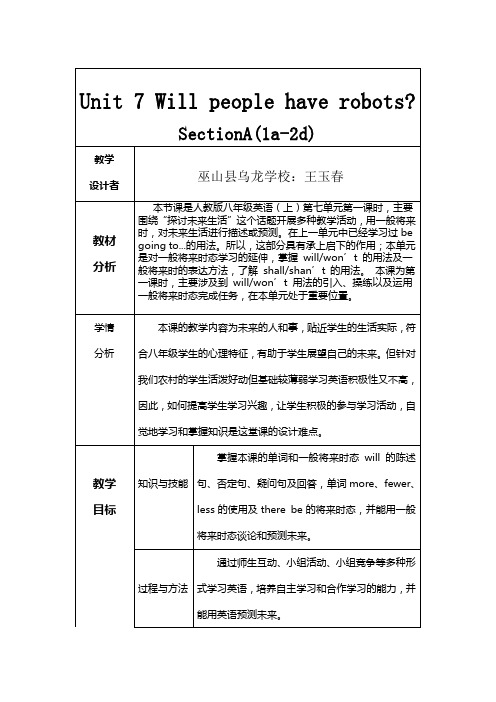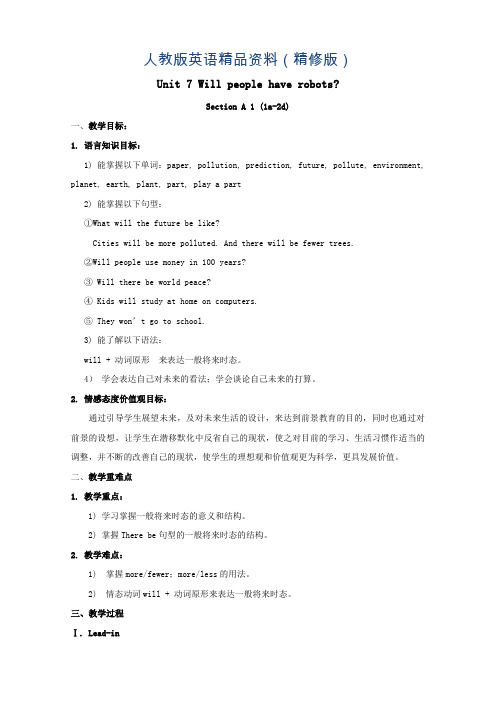英语人教版八年级上册Unit7 第一课时教案
- 格式:docx
- 大小:16.07 KB
- 文档页数:4

人教版英语八年级上册Unit 7《Will people have robots》教学设计一. 教材分析人教版英语八年级上册Unit 7 “Will people have robots” 主要围绕未来科技的发展,特别是机器人的应用进行展开。
本节课主要通过一个关于未来世界的对话,让学生掌握一般将来时的用法,以及如何谈论未来的一些预测。
教材还包括一些阅读材料和任务,旨在提高学生的阅读理解和口语表达能力。
二. 学情分析八年级的学生已经掌握了基本的英语语法和词汇,对一般现在时和一般过去时已经有了初步的了解。
但是,对于一般将来时的用法和如何准确地谈论未来的预测还需要进一步的讲解和练习。
此外,学生在阅读理解和口语表达方面还需要加强。
三. 教学目标1.学生能够理解和运用一般将来时。
2.学生能够通过阅读材料和对话,了解未来科技的发展趋势。
3.学生能够提高自己的阅读理解和口语表达能力。
四. 教学重难点1.一般将来时的用法。
2.如何准确地谈论未来的预测。
3.阅读理解和口语表达能力的提高。
五. 教学方法1.任务驱动法:通过设定一些与学生生活息息相关的情景,让学生在完成任务的过程中学习和运用语言。
2.交际法:通过模拟真实的交流场景,让学生在实际的语言环境中学习和运用语言。
3.合作学习法:通过小组讨论和合作,让学生相互学习,共同提高。
六. 教学准备1.教材和教学参考书。
2.多媒体教学设备。
3.与课程内容相关的网络资源。
七. 教学过程1.导入(5分钟)通过向学生展示一些机器人的图片,引起学生的兴趣,然后提问:“你们认为未来的人们会拥有机器人吗?”,让学生发表自己的看法。
2.呈现(10分钟)老师通过讲解和示范,向学生介绍一般将来时的用法,并举例说明如何准确地谈论未来的预测。
3.操练(10分钟)学生分组进行角色扮演,模拟真实的交流场景,运用一般将来时进行对话。
老师对学生的表现进行指导和评价。
4.巩固(10分钟)学生阅读教材中的阅读材料,理解并回答相关问题。


给你不一样的英语课:八年级上Unit7教案。
八年级上Unit 7教案的重点在于让学生变成主动学习者。
这意味着在教师的带领下,学生可以自行探索英语的知识和规则,让学生不再只是被动吸收知识而是学会主动思考。
例如,在介绍动名词时,教师并不会仅仅给出正确的答案,而是让学生根据给出的句子自己去发现动名词,并了解其使用方法。
这种让学生自己找寻答案的方法能够让学生更加深入理解英语规则,能够加强学生在英语学习中的主动性、积极性和自信心。
这个教案还添加了互动环节。
教师在教学过程中设计了多个合作小组的环节,让学生在小组中讨论并尝试解决问题。
这不仅可以培养每个学生的合作精神,而且还增加了学生对于英语学习的兴趣。
在小组中讨论是不同于单独学习的,学生们能够交流彼此的策略,分享学习经验,相互促进,从而取得更好的成果。
值得一提的是,教师还采用了许多多媒体辅助教学过程,例如使用视频、图片等工具来更好地丰富教学内容,让学生实现多媒体手段在英语学习上的应用,提高学生的视听能力,让学生在不断适应不同环境中掌握英语知识。
八年级上Unit 7教案给予了学生与传统英语课不同的学习体验。
教师从不同角度仔细规划和设计课程,充分利用小组合作、互动沟通等形式,调动了学生的学习热情和积极性,增强学生主动性、创造性和思维能力。
在未来的日子里,教师们应该更加关注学生的需求,为
学生们提供更加智能化、有趣和贴近生活的教学资源,让走进课堂的每一位学生都能够享受到这样的学习体验。


Unit 7 Will people have robots?答语:Yes, there will. / No, there won’t.三、可数名词1. more +不可数名词2. less + 不可数名词3. fewer + 可数名词Ⅳ. PracticeWork on 3a:1. Tell Ss to read the conversation in 3a and try to fill in the blanks withmore/ less or fewer.2. 方法指导:应通读整个对话,掌握对话大意;然后,根据空格后的名词是可数名词还是不可数名词来确定是用more, less 还是fewer。
注意,有些名词前有形容词来修饰。
3. 最后,教师与同学们一起校对答案,并对学生们有疑问的地方进行解释。
4. 学生们阅读这些句子并试着记住这些句子。
Work on 3b:1. 让学生们阅读句子的开头,明白每个句子的意思。
2. 让学生们思考一下针对这一情况,在将来会发生什么样的情况。
3. 让学生们互相检查自己所写的句子,发现并改正错误。
4. 让部分学生说一说自己所写的句子。
大家一起改正句子中的错误。
Ⅴ. Group work1. 小组中的同学们对未来的城市进行讨论。
2. 每个成员发表自己的想法,小组长进行记录,并进行汇总。
3. 最后,同学们根据小组成员的想法,然后,展开想象,试着每名同学们画一幅未来城市的画。
4. 最后,比较一下每个小组的画,看哪个小组画得较好。
5. 试着对自己小组里的情况用英语做成一个报告。
Ⅵ. ExercisesIf time is enough, do some more exercises on big screen.Homework1. 复习Grammar Focus 中的内容。
展开你想象的翅膀,想一下50年后,你的生活将会怎么样?并写六个句子来描述一下。
In fifty years, …教学反思。




Unit 7 Will people have robots?Section A (1a-2d)单词paper,pollution,future,pollute,environment1.掌握一般将来时的意义和结构。
2.掌握There be句型的一般将来时的结构。
1.掌握more/fewer;more/less的用法。
2.“will +动词原形”表达一般将来时态。
Step 1以机器人相关视频来导入新课,调动学生学习的积极性。
Warming up and leading inShow Ss a video about robots and ask them some questions after watching it:What can you see in the video?Do you think it possible that every home has a robot?What can robots do for us?Step 2用形象的方式帮助学生掌握新词汇。
让学生在预测的过程中加深对词汇的理解。
1.New wordsShow Ss some pictures of the new words in this period: paper, pollution, future, planet, earth, plant.2.Work on 1a①Ask Ss to read the predictions in 1a. Let them think about how the world will be different 100 years from now.②Get Ss to check (√)A for agree or D for disagree. Then check the answers with the class together.【Keys: Answers will vary.】Step 3让学生在听的过程中掌握抓住关键信息的方法。


人教版八年级英语上册Unit 7教案Unit 7: Will People Have Robots?In this unit。
students will imagine what the future will be like and make ns.One of the main concerns for the future is the XXX。
we will be in great danger。
It is important to take n now to XXX.Robots will play a part in the future。
and it is possible that every home will have one。
They can help with tasks that XXX。
XXX will shape our future in a negative way.In 100 years。
it is unlikely that people will still use money。
Everything will be free。
and we will have to find new ways to measure value。
This will have a XXX.Space will also be a significant part of our future。
We may have space XXX will have to adapt to living in a new XXX.It is XXX future is not set in stone。
We can make choices now that will impact what happens in the future。
Let's work towards a future of peace。


Unit 7 Will people have robots?(Section A 1a-2c)一、教材分析:(一)、本节教材的地位和作用本课是新目标英语八年级上册的第七单元的Section A 的第一部分,本节教材所涉及内容在中考中占有相当重要的地位。
本节教材围绕着“将来发生的事”展开,要求学生学习和运用“will+v(原)”构成的一般将来时态。
本课教学内容与学生的实际生活相关,可以利用学生的想象,引导学生运用简单的英语来描述将来的生活和事物。
在学习活动中,学生通过对将来发生的事情的描述,促进学生对美好未来的憧憬。
(二)、教学目标:(1)知识与技能1.指导学生学习有关将来要发生的事情的表达及语法知识点“一般将来时” 。
2.培养学生的口头表达能力、阅读理解能力和写作能力。
1. 学习有关的单词及词组:robot, paper, pollution, tree, subway, computer, will, won ’ t ,they’ll, fewer, be free, on paper, live to be, in 100 years, etc. 2. 学习重要句型:(1)People will have robots in their homes. (2)Will people have robots?. (3)Kids won’ t go to school. (4) There will be less pollution. 3. 掌握语法点:The Simple Future Tense ( 一般将来时) (1)教师自制的多媒体课件;(2)上课环境为多环境。
(2)情感目标:通过学生对自己in five years 的展望,设想自己五年,十年,甚至是二十年后的生活,贴近学生生活实际,符合学生好奇的心理,激发学生浓厚的学习兴趣。
(3) 学习策略:通过任务型的教学,让学生学会自主学习,归纳总结,培养主动学习的能力。



Unit 7Will people have robots?Section A (1a-1c)1.重点单词:paper2.重点短语:in their homes,in 100 years,on computer,on paper3.重点句式:—Do you think there will be robots in people's homes?—Yes,there will.Kids won't go to school.They will study at home on computers.People will live to be 200 years old.—Will people use money in 100 years?—No,they won't.Everything will be free.1.will构成的一般将来时态的肯定句、否定句、一般疑问句及回答2.做预言,用will来讨论未来发生的事情做预言,用will来讨论未来发生的事情一、预习课本P49新单词并背诵,完成下面的汉译英。
纸张____________二、认真预习1a-1c,找出下列短语和句型。
1.在他们的家中____________________2.100年之后____________________3.通过电脑____________________4.在纸上____________________5.—你认为在人们的家中会有机器人吗?—是的,将会有。
________________________________________________________________________6.孩子们不用去上学,他们将在家里通过电脑学习。
________________________________________________________________________7.人们将会活到200岁。


人教版英语精品资料(精修版)Unit 7 Will people have robots?Section A 1 (1a-2d)一、教学目标:1. 语言知识目标:1) 能掌握以下单词:paper, pollution, prediction, future, pollute, environment, planet, earth, plant, part, play a part2) 能掌握以下句型:①What will the future be like?Cities will be more polluted. And there will be fewer trees.②Will people use money in 100 years?③ Will there be world peace?④ Kids will study at home on computers.⑤ They won’t go to school.3) 能了解以下语法:will + 动词原形来表达一般将来时态。
4)学会表达自己对未来的看法;学会谈论自己未来的打算。
2. 情感态度价值观目标:通过引导学生展望未来,及对未来生活的设计,来达到前景教育的目的,同时也通过对前景的设想,让学生在潜移默化中反省自己的现状,使之对目前的学习、生活习惯作适当的调整,并不断的改善自己的现状,使学生的理想观和价值观更为科学,更具发展价值。
二、教学重难点1. 教学重点:1) 学习掌握一般将来时态的意义和结构。
2) 掌握There be句型的一般将来时态的结构。
2. 教学难点:1)掌握more/fewer;more/less的用法。
2)情态动词will + 动词原形来表达一般将来时态。
三、教学过程Ⅰ. Lead-in1. 在大屏幕上向学生展示一些机器人的图片,让学生们说出谈论自己的未来的工作,对工作的打算等:What do you want to be when you grow up?Ss: I want to be a scientist.T: How are you going to do that?Ss: I’m going to study science hard.….2. 学生们根据图片来引导出机器人这一话题。
Unit 7 Will people have robots?
The First Period
Section A (1a-2d)
Ⅰ.Teaching aims:
1.Knowledge aims:
(1)Key words:paper,pollution,future,pollute,environment,planet,earth,plant,part
(2)Key phrases:play a part,on computers,live to be ... years old,in 100 years,in danger
(3)Important sentences:
①People will live to be 200 years old.
①Will people use money in 100 years?
①There will be less pollution.
①Everyone should play a part in saving the earth.
2.Ability aims:Talk about predictions about the future.
3.Emotion aims:Let their imagination fly to the future.
II.Important points:Learn to express sentences using “will be/do”.
III.Difficult points:Grasp the differences among less,fewer and more.
IV.Teaching process:
Step 1 Lead in
Show some pictures about robot movies like I, Robot,Star Wars: The Force Awakens and Transformers Age of Extinction etc.to students,then let them talk about the following questions.
1.Will we have robots in our houses in 100 years?
2.Will we use money?
3.Will books be on the computers?
4.Won’t kids go to school,and they will study at home on computers.
5.Will there be only one country?
5.Will we be young forever?
1a How will the world be different 100 years from now?Read these predictions.Check (√) A (for agree) or D (for disagree).
Check the answers with students.
Step 2 Listening
1b Listen and circle the predictions you hear in 1a.
2a Listen and circle the words you hear.
2b Listen again.Check (√) the predictions you hear.
Check the answers with students,and correct the answers.
Step 3 Pairwork
1c Ask and answer questions about the predictions in 1a.
A:Will people use money in 100 years?
B:No,they won’t.Everything will be free.Will people live to be 200 years old?
A:Yes,they will.
Role-play the conversation.
2c Make conversations about the predictions in 2a and 2b.
A:What’s your prediction about the future?
B:I think there will be more pollution.
A:Really?I don’t think so.But I think there will be fewer trees.
Step 4 Read and act
2d Ask the students practice the conversation with their partners.Then let some pairs to act out the conversation.
Language points
1.People will live to be 200 years old.人们将会活到200岁。
(教材第49页)
(1)live to+基数词+year(s) old意为“活到……岁”。
In the story,people will live to be 500 years old.在这个故事中,人们将活到500岁。
(2)live此处用作不及物动词,意为“居住;生活”。
I live in Beijing.我住在北京。
We live happily.我们过着幸福的生活。
2.But I want to live on the earth.但我想住在地球上。
(教材第50页)
辨析:on the earth与on earth
What on earth do you mean?你究竟是什么意思?
3.Everyone should play a part in saving the earth.每个人都应当尽一份力来拯救地球。
(教材第50页)
play a part in意为“参与;在……中尽自己的一份力量”,其后可接名词、代词或动词的-ing 形式。
Education can play a part in it.教育可以在其中起到作用。
At the concert,every fan will play a part in the movie.演唱会的每一位歌迷都是这部电影里的
一员。
Exercise
一、根据提示写单词。
1.Cities w_________be very crowded in 100 years.
2.I hope there will be less ________(污染) in the near future.
3.What’s your ________(预测) about the future,Jim?
4.Please write your telephone number on a piece of p________.
二、单项选择。
1.—I don’t think people will use money in the future.Everything will be free.
—Well,________.
A.I agree
B.I don’t
C.I will
D.I won’t
2.The old man is very healthy.I think he will live ________.
A.90 years old
B.at 90 years old
C.to be 90 years old
D.in 90 years old
3.—Will there be fewer students in 5 years?
—________
A.Yes,there are
B.No,there aren’t
C.Yes,there will
D.No,it won’t
4.I hear our teacher will be back ________ three weeks’ time.
A.at
B.in
C.for
D.after
5.We lost the match because they had ________ players.They had eleven and we have only one.
A.stronger
B.younger
C.fewer
D.more Homework
1.Review the new words and phrases.
2.Make a conversation about the future you like.
板书设计
Unit 7 Will people have robots?
The First Period
Section A (1a-2d)
—Will people use money in 100 years?
—No,they won’t.Everything will be free.Will people live to be 200 years old?
—Yes,they will.。